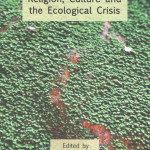Religion, Culture and the Ecological Crisis
Edited by Siddhartha
A Meeting Rivers Publication
Pipal Tree
Fireflies Ashram
Dinnepalya, P.O. Kaggalipura
Bangalore-560082
Email: [email protected]
Pages 300, Price: Not mentioned,
Ph: 0-96206-61111,
————————–
Reviewed By Yoginder Sikand
——————————
That human beings’ seemingly insatiable greed is rapidly destroying the earth’s delicate ecology, and even threatening to destroy the earth itself, is something that is now widely recognized. But this realization has triggered little by way of practical measures to address what is literally a life-and-death question for all life-forms on earth.
Responses to this crisis often take the form of proposing technological solutions”for instance, advocating shift to renewable energy instead of fossil fuels, tree-planting drives, recycling paper, and so on. While all these may be valuable, they are not adequate in the face of the magnitude of the crisis.
Hedonism fuels greed
The ecological crisis stems hegemonic worldview of Hedonism. According to Hedonism, the purpose of human life is to maximize sensual stimulation, encapsulated by the alluring slogan ‘Eat, drink and make merry!” Life, for hedonists, is”or, rather, ought to be”one long, non-stop party. Hedonism defines you by what you have and consume, rather than by what you are. The more ‘good’ things you own and ‘enjoy’ the more ‘successful’ you are.
Hedonism demands ever-increasing consumption of goods and services, and this means depletion of the earth’s limited resources. Hedonism, now gone completely berserk, is playing havoc with the global ecology, as this timely book wants us to recognize. The book reminds us that the ecological crisis is rooted in the crisis of worldviews, and therefore, that its solution must be rooted in a transformation of our understanding of our place in the cosmos. Mere technical solutions cannot do much.
Ecological Sanity
The contributors to this volume represent a diverse range of religious and spiritual perspectives, including Hindu, Islamic, Christian, Buddhist, Sikh, and secular humanist. Despite their differing beliefs about the reality of the cosmos, their spiritual commitments lead them to argue for pretty much the same things, a remarkable testimony to the importance of interfaith dialogue and solidarity to work together for the common cause of protecting the global environment, an issue that intimately concerns us all. Working for ecological sanity can also become a powerful means to bring people of different faiths to bond together”a desperate need today in a world that is being torn apart by bloody conflicts in the name of religion and ideology.
Religions can, of course, be diversely understood, often in very contradictory ways. Some interpret them to justify the pillage of the environment, reflected in the theory of the universe being the dominion of human beings. Others suggest this world to be mere illusion and one should be concerned only about what follows death. Such attitudes only help us ignore the harm we are causing to the environment. Alternative interpretations of religion that sensitize us to our intimate inter-connectedness with the rest of the earth and challenge hedonist worldviews are, however, also possible.
Self-restraint
Given the specificities of each faith, their understandings of the relationship between human beings and the rest of the cosmos would differ in some major respects. Yet, they share a common concern for the earth and its environment. Notwithstanding their differing premises, they can espouse a passionate concern for protecting the earth’s environment and for caring of non-human forms of life. The Jain stress on non-violence, Hindu teachings about respect for nature, the Buddhist notion of the interdependence of all beings, Islam’s espousal of man being a trustee of God of earthly resources, Sikhism’s reminder that we humans are just a tiny speck in God’s enormous creation and so we should abandon our pretensions of being masters of the entire world, Jesus’ message of a simple lifestyle”all these and more are teachings that, if taken seriously and lived out personally can guide them to follow a less ecologically-damaging lifestyle. These values include non-greed and non-acquisitiveness, simple living, self-restraint, compassion and care for others (including non-human beings), all of which sharply undermine the logic of Hedonism.
Maximizing the quantum of sensual stimulation lies at the core of hedonism. In contrast, religions remind us that this life is a testing-ground. Life, they say, does not cease with the dissolution of the body. Rather, it continues into eternity, even after we have left our bodies behind on our inevitable physical death. Our future in the everlasting Hereafter is shaped by our actions in this world. Theistic religions stress the need for being constantly aware of God and strictly comply with His likes and dislikes.
Abstemiousness
These teachings have very vital ecological consequences. Consciousness of the fact that God is aware of our every action can be a powerful means for us to transform our lifestyles and to become more ecologically-intelligent. If you know that God does not want you to be greedy and that rampant greed will work against you in the Hereafter, you may be dissuaded to buy that smart-looking, heavily-discounted pair of shoes that you don’t really need. This consciousness may result in putting off a bulb in a room when you step out, turning off a leaking tap or being content with just a single ballpoint pen rather than a pack.
This book is a powerful reminder of the fact that the ecological crises cannot be countered unless individuals and groups transform their worldviews and learn to restrain their greed. This involves re-thinking our understandings of ‘development’ and ‘progress’ at a very fundamental level, and, beyond that, the very purpose of our life on earth. Ultimately, then, it is a spiritual issue.
Not-very-careful editing of some bits of the volume and certain chapters that are unnecessarily long and theoretical and that could easily have been summarized into half their present size (thereby making the book take up less paper and printing ink and, in that way, enabling it to have less of an impact on the environment) should not, however, detract from the book’s crucial message.


COMMENTS